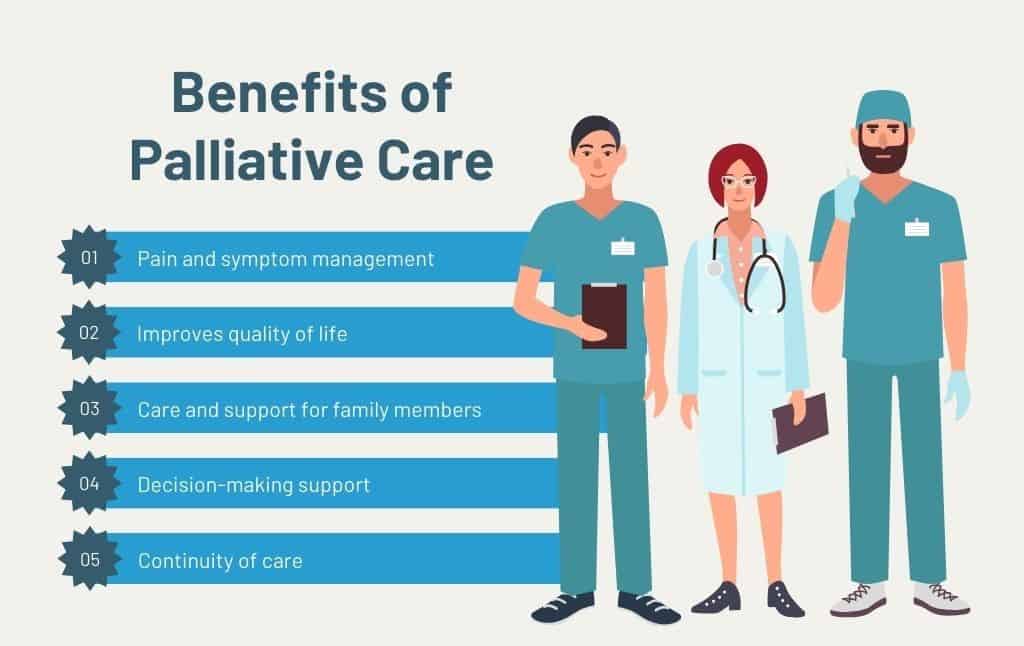
Considering palliative care for yourself or your loved one, but don’t understand what it is all about? Or maybe you have heard some myths, and just want a quick run-through of what palliative care entails.
This blog post outlines 10 palliative care fast facts you need to know. Let’s get started.
1 – What Is Palliative Care?
Palliative care is a medical specialty with a focus on improving the quality of life of individuals with serious illnesses such as heart disease, cancer, and live disease while exploring curative treatment. It seeks to provide relief from the symptoms and stress of the serious health condition.
2 – What Are The Benefits Of Palliative Care?

The benefits of palliative care include:
- Pain and symptom management
- Improved quality of life
- Care and support for family members
- Decision-making support
- Continuity of care
Palliative care focuses on comfort care while exploring treatment options. Your palliative care team works together to ease your pain and discomfort. Additionally, other aspects of your overall well-being such as your mental, emotional, and spiritual health are not neglected, leading to an improved quality of life despite the illness.
Family members are not left out, as palliative care offers training, resources, guidance, and counseling to help families cope and provide them with the right education about their loved one’s illness, and how to care for them.
The palliative care team also provides support for critical decisions regarding treatment options and advanced care planning including a living will and a durable power of attorney for health care.
Continuity of care is also assured, as patients can easily transition to hospice care if the illness becomes terminal.
3 – Who Benefits From Palliative Care?
Anyone facing a serious health condition can benefit from palliative care. This includes health conditions such as:
- Cancer
- Heart disease
- End-stage liver disease
- Lung cancer
- Kidney failure
- Dementia
- Parkinson’s disease and other serious illnesses.
4 – Who Makes Up The Palliative Care Team?
The palliative care team is made up of an interdisciplinary network of healthcare professionals. They all work together to ensure quality care is provided.
The team typically includes:
- Doctors or physicians
- Nurses
- Physical, occupational, and speech therapists
- Spiritual leaders
- Social workers
- Trained volunteers
You may not need all of them in your team. Who makes up your team depends on your health condition and your preference.
5 – Where Can I Receive Palliative Care?

Palliative care can be provided in a variety of settings. This includes:
- Hospitals
- Assisted living homes
- Nursing homes
- Out-patient palliative care centers
- At Home
There is this misconception that palliative care cannot be administered at home, which is not the case. If you or your loved one prefers to age and receive care at home, your palliative care team can come at the agreed schedules to provide care from the comfort of home.
6 – When Is The Best Time To Receive Palliative Care?
Palliative care can be beneficial at any stage of a serious illness, regardless of the prognosis. It can be initiated alongside curative treatments to improve a patient’s quality of life.
Ideally, it’s best to start palliative care as early as possible after a serious diagnosis. This helps manage symptoms, provide emotional support, and address the various aspects of care—physical, emotional, and spiritual—throughout the illness trajectory.
Starting early can offer better symptom management, help patients and families navigate complex medical decisions, and enhance overall well-being.
7 – Is Palliative Care The Same As Hospice Care?
Palliative and hospice care are sometimes used to mean the same thing. While they have some similarities, the major difference is when the care is offered.
For palliative care, care can be offered as soon as a diagnosis is made, and at any point of the serious illness. Whereas for hospice, care is offered only when the patient has a prognosis of six months or less to live.
Another difference is that for palliative care, curative treatment is still offered, while for hospice, exploring curative treatment has stopped.
8 – Is Palliative Care End Of Life Care?
No. Hospice care is end-of-life care. Palliative care focuses on comfort and improving the quality of life of the patient while exploring treatment options regardless of the prognosis.
Curative treatment can fail, and the patient now has to transition to end-of-life care (hospice). It’s also possible for a patient to be in hospice, and live for more than the estimated six months, then discontinue hospice care, and go back to exploring treatment options.
9 – How Do I Pay For Palliative Care?
Public and private health insurance can help pay for some palliative care costs.
Medicare can help pay for some costs of palliative care such as durable medical equipment, wheelchairs, and prescription drugs. If your loved one is a Medicare beneficiary, you can contact an authorized official to learn more about the extent of coverage.
Medicaid, a public health insurance for low-income individuals can also cover the cost of palliative care if your loved one qualifies. However, note that Medicaid eligibility criteria and extent of coverage differ from state to state. Consult a Medicaid official in the state you or your loved one resides.
Long-term care insurance can also cover the cost of palliative care. If your loved one has private insurance, be sure to reach out to their provider to learn more about coverage.
10 – How Do I Get Palliative Care?
![fast facts palliative care - how to get palliative care]](https://amyseden.com/wp-content/uploads/2023/12/word-image-46564-4-1024x683.jpeg)
The first step to access palliative care is to ask your primary physician for a referral. They might recommend a provider in your area. Your primary doctor may also start palliative care for you.
You can also look up online directories such as getpalliativecare.org and the National Hospice and Palliative Care Organization. To find a provider near you, just input your address, ZIP code, city, or state.
Additionally, you can type in keywords like “palliative care near me” on Google and Bing to find palliative providers close to you.
Make sure you evaluate a provider before moving forward with them. Some factors to consider include:
- History and Reputation
- Certification and licenses of the care team
- Payment policies, including whether they accept Medicare, Medicaid, or private health insurance
- Extent of care including whether they offer personalized care and patient teaching
- Support for family members
- Support with end-of-life planning and decision-making
- Procedure for handling emergencies
- Where care is provided
Only when you have satisfactory answers around these factors should you move forward with a provider. Palliative care unlike hospice, doesn’t have a national guideline regulating the quality of care. It’s best to go with a provider that puts your care needs at the center of all they do.
Compassionate Palliative Care Is Just A Click Away
If you’re in search of a credible and compassionate palliative care provider in Carson City, Reno, and the surrounding areas, Amy’s Eden is just a phone call or email away.
With over 10 years of experience providing quality care to older adults, we have designed our care approach to ensure dignity, comfort, and happiness.
Our caregivers are trained and experienced in providing above-industry care, and we put the needs of our clients at the center of all we do.
To learn more about the extent of our palliative care services, do not hesitate to contact us today. We can’t wait to help you thrive and navigate this journey.




